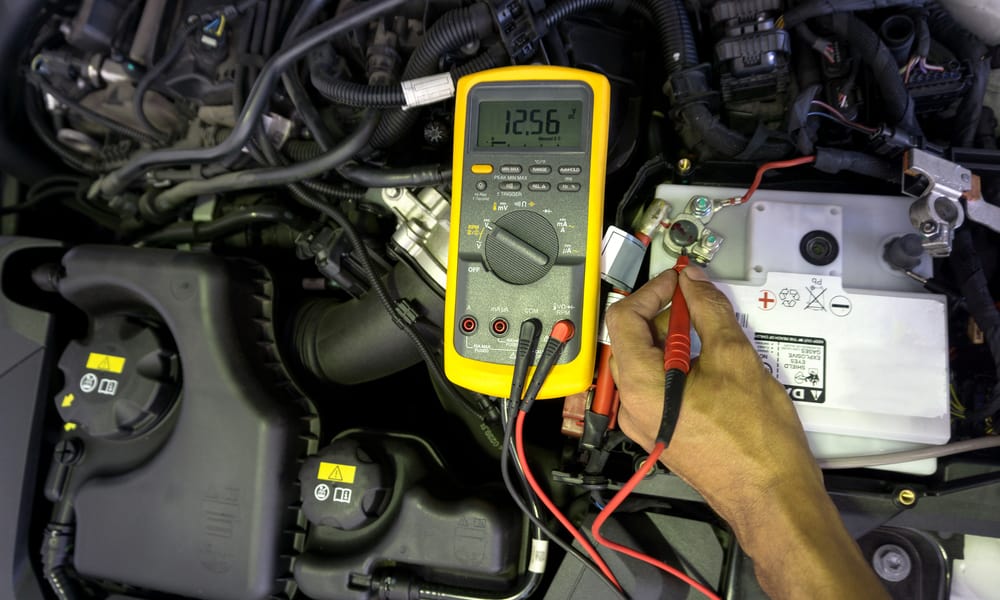You probably know how horrible it is when you turn on your car key, and nothing happens. I hate such a situation, especially when I am in a hurry. The first thing that comes to your mind will be how long to charge the car battery before you can leave. There are a lot of reasons why that happens, and they are often connected with the battery itself.
You can expect such a situation when the battery went wrong and when you forgot to turn off the lights, or you have been using your car for a more extended period. Regardless of the reason, there is no need to panic. I will help you calculate the exact time you will need to charge your car battery.
Things to Consider
The battery
All car batteries have the standard of the 12.6 volts, but they differ in amperage. On average, the car batteries are from 20 amp (amperes) to 60 amps. As you can expect, bigger and more massive cars require a battery with more ampere-hours.
Having a 20-ampere-hour battery means that you can use it for one hour before it stops working correctly. That is why a car battery dies when you forget to turn off the lights overnight.
Be aware that many car appliances use a battery. For instance, a simple halogen headlight bulb needs from 4 to 8 amperes for one hour to function adequately! So, if you experience problems with your battery, try to reduce all additional and unnecessary appliances at that particular moment.
Keep in mind that you automatically charge your battery while driving the longer routes. That means you can freely use the battery without restrictions during a long drive. Once you stop, there is no charging available. As a result, appliances using a battery keep depleting it, and the problem appears very soon.
The alternator
Another problem to consider is the issues with an alternator. It is a mechanical part of the car that charges the battery when your vehicle moves.
If it stops working correctly, your car battery won’t charge while driving. The only thing you can do in such a situation is to consult a mechanic to solve the problem.
Battery Chargers
Now, let’s consider the issues regarding the charging of your empty battery. Once the problem occurs, you will need a battery charger. Always choose a model with an option for recharging the battery that fits you the most:
- The jump-start charging option
- 2 amperes charging option
- 10 amperes charging options
- 30 amperes charging option
- There are some chargers with even higher amperage
The more significant is the amperage figure on the charger, the faster you will charge your battery. On the contrary, the lower charging number will save your battery more in the long run.
Also, some of the chargers are simple, with no indicators whatsoever. Nonetheless, they charge the battery the same as the chargers with more features.
The charging feature of 2 amps means that you can charge your battery two amperes per hour. Therefore, if you have a battery of 40 amps, you will need 20 hours to charge it completely.
The calculation is quite evident when your battery is empty. If it is not a case, you will need to do more calculations.
Calculating Exact Time of Charging
As I have already mentioned, every battery has a standard of 12, 6 volts. The question is how to calculate the time of charging if the battery is half or totally empty. It would help if you had an automotive multimeter or a car battery tester to check the voltage in your battery. Let’s calculate!
Step 1
Let’s assume you have a battery of 40 amps. You know that 100% of the battery is 12, 6 volts. So, if the multimeter reads 6 volts, you can say that approximately 50% of your battery is empty.
Step 2
Once you calculate that you need to charge 50% of the battery to gain the full capacity, the procedure is not complicated.
- 100% of capacity is 40 amps
- Consequently, 50 % of the battery will be 20 amps
So, you need to charge 20 amps to obtain a fully charged battery.
Step 3
The charging time will depend on the charging feature you pick on your battery charger. For instance, if you take a standard low charge of 2 amps, you will need ten hours to charge 20 amps.
Why? Well, if you need 20 amps, and the charger can charge 2 amps per hour, you need to divide those two numbers to get the number of hours you need for charging. On the other hand, in case you decide to use a high charge of 10 amps, you will need just two hours to charge your car battery fully.
Which Charger to Use
The dilemma that has bothered many drivers is which charger to choose? You can pick out any model from 2 to 30 amps, sometimes even more.
Since nobody likes to wait forever to charge the battery, most people choose the faster chargers. However, chargers with lower amperage are more secure, and you should choose one of them if you had enough time for charging.
Most professionals recommend picking out a charger from 2 to 15 amps as the best option for long-lasting battery usage.
How to Determine If the Battery Is Fully Charged?
In case you have modern chargers with many features, all you need to do is to follow the instruction on display. Those chargers usually have the option to stop charging once the battery is full.
On the other hand, if you have an older model, you will need to do some check-ups. For a start, you need to calculate the time required for the battery to charge. Then, you should check the battery from time to time by using appropriate equipment to measure the voltage.
Until the measured voltage reaches 12.4 to 12.6 volts, the battery is not full. As soon as the voltage meter shows the required value, you need to disconnect the charger.
Conclusion
Battery chargers come in many designs and sizes. When you need to go on a long trip, it is useful to have one, just in case. You never know when and where you will find it helpful and handy.


